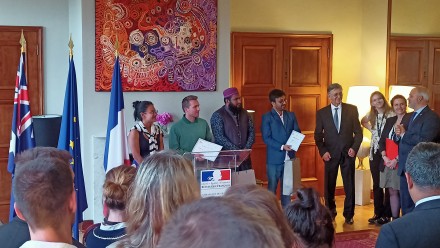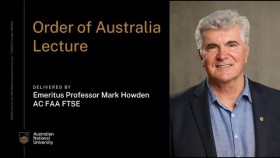Empowering Innovation: French-Australian Hackathon Tackles Environmental Challenges
The Australian-French Association for Research and Innovation (AFRAN) and the Embassy of France to Australia organised a French-Australian innovation hackathon to address environmental challenges with young professionals from diverse fields of research. The "Hacking the Environment: Climate, Energy, Health, Social Sciences... and you!" event was supported by the Department of Industry, Science and Resources and organised with the Canberra Innovation Network (CBRIN) and La French Tech as valuable partners. Dr Igor Skryabin, Research and Business Development Manager (Energy) at ANU Institute for Climate, Energy & Disaster Solutions, was invited to coordinate this hackathon.
The innovation hackathon led groups of four or five PhD students to create their own company on low-emission and sustainable solutions. During 48 hours at The Australian National University campus, the teams experienced learning phases and creation phases. In the end, each group pitched their company project in front of a panel of sponsors. The competition group winner was announced by Dr Skryabin at the reception of the Embassy of France to Australia last November 5th. The group was composed of Sourav Ghosh from the University of Melbourne, Md Morshed Alam from UTS, Adriana Luga and Grégoire Davignon, both collaborating between the University of New Caledonia and the Institut Pasteur in New Caledonia. This talented team won with the project Algibrick, which was focused on creating eco-friendly bricks for buildings to capture CO₂ and provide effective insulation.
Grégoire Davignon, a PhD student of microbiology and cellular biology from the Institut Pasteur of New Caledonia, said after the awards ceremony: "This experience was both inspiring and rewarding, and I highly recommend these kinds of challenges for PhD students—they're an incredible way to push your limits and collaborate with passionate people. They also play an important role in broadening our perspective and providing valuable insights into the world of entrepreneurship."
Sourav Ghosh, a PhD student of mechanical engineering (Integrated Computational Materials Engineering Group) at UniMelb comments from his experience in the hackaton: "This hackathon was an incredible platform to bring diverse skills together and focus on sustainable solutions for real-world climate challenges. Collaborating with a multidisciplinary team allowed me to expand my perspective on environmental innovation, reinforcing the impact we can achieve through collective expertise and shared purpose."
Md Morshed Alam, a PhD candidate in Engineering at the University of Technology Sydney, highlights these two days at The Australian National University: "With the rapid advancement of artificial intelligence, now is a pivotal moment to harness its potential across sectors for the benefit of our planet. I extend my sincere gratitude to AFRAN for organising this idea competition, which focuses on two crucial areas: environmental preservation and energy transition. The more opportunities we create to develop innovative ideas, the more we can leverage modern technology to serve and protect the Earth. This experience was both inspiring and fulfilling, and I wholeheartedly recommend participating in such challenges—they offer a remarkable way to push boundaries and collaborate with individuals who share a passion for making a positive impact."
The youngest of the team, Adriana Luga, a PhD student specialising in leptospirosis research from the Institut Pasteur of New Caledonia, was surprised after the announcement of the winners. She said: "Winning was an incredible surprise! The past few days have been a whirlwind of challenges, inspiration, and immense rewards. My heartfelt thanks go to AFRAN and the French Embassy in Australia for providing such a remarkable experience. I strongly encourage students to take part in the next session—it's an extraordinary opportunity to push your limits and collaborate with exceptional individuals."











